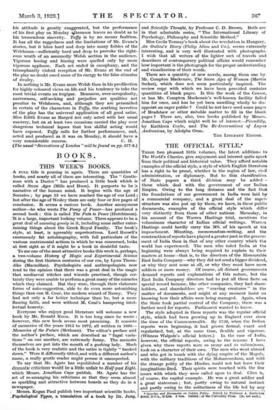BOOKS.
THIS WEEK'S BOOKS.
A PULE tide is pouring in again. There are quantities of books, and nearly all of them are interesting. The " Gentle- man with a Duster " has produced a little book which is called Seven Ages (Mills and Boon). It purports to be narrative of the human mind. It begins with the age of Socrates ; by page 55 we have reached the-age of our Lord ; but after the age of Wesley-there are only four or five pages of conclusion. It seems a curious book. Another anonymous author—he who wrote.The Pomp of Power—has produced a second book : this is called- The Path to Peace (Hutchinson). It is a large, important looking volume. There appears to be a great deal of amusing gossip in it, including some rather enter- taining things about the Greek Royal Family. The book's style, at: least, is agreeably unpretentious. Lord Russell's enormously fat autobiography, with full particulars of the various matrimonial actions in which he was concerned, looks at first sight as if it might be a book in doubtful taste.
To me one of the most attractive books this week is, perhaps, a. two-volume History of Magic and Experimental Science during the first thirteen centuries of our era, by Lynn Thorn- dike (Macmillan). Psychologists and anthropologists now tend to the opinion that there was a great deal in the magic :that mediaeval witches and wizards practised; though cer- tainly they were unable to perform a great many of the miracles which they claimed. But they were, through their elaborate forms of auto-suggestion, able to do even more astonishing things than can M. Cone, the modern wizard of Nancy. They had not only a far better technique than he, but a more `flaming faith, and were without M. Coue's hampering intel- lectual honesty.
Everyone who enjoys good literature will welcome a new book by Mr, Ronald Knox. It is too long since he wrote ; however, this new book seems most promising. It consists of memories of the years 1915 to 1972, all written in 1988— Memories of the Future (Methuen): The editor's preface and the author's preface, which are described as " fugal varia- tions " on one another, are extremely funny. The memoirs themselves are put into the month of a gushing lady. Much of the book is very realistic and the satire is tightly " banked down." Were it differentlytitled, and with a different author's name, a really gentle reader might peruse it unsuspected.
To say that Mr. Agate has republished a number of his dramatic criticisms would be a little unfair to Half-past Eight, which Messrs. Jonathan Cape publish. Mr. Agate has the art of re-arranging his criticisms so that they seem almost as sparkling and attractive between boards as they do in a newspaper.
Messrs. Megan Paul publish two important scientific books, ,Psychologieat Types, a translation of a book by Dr. Jung, and Scientifle Thought, by Professor C. D. Brown. Both are in that admirable series, " The. International. Library of Psychology, Philosophy and Scientific Method."
Miss Cecile Tormay's book about the revolution in Hungary, An Outlaw's Diary (Philip Allan and Co.), seems extremely interesting, and is very well illustrated with photographs. I wish that all writers of the lighter sort of travels and describers of contemporary political affairs would remember how important is the photograph for the proper understanding and visualization of their words.
There are a quantity of new novels, among them one by Mr. Compton Mackenzie, The Seven Ages of Woman (Martin Seeker), which does not seem particularly inspired. The review copy with which we have been provided contains quantities of blank pages. Is this the work of the. Censor, or has Mr. Compton Mackenzie's well-known facility failed him for once, and has he yet been unwilling wholly to. dis- appoint an eager public ? Could he not have used some pages of Bradshaw or other suitable matter to fill in the blank pages ? There are, also, two books published by Messrs.. Jonathan Cape which might well be of interest—Piccadilly, by Kathleen Coyle, and The Re-Incarnations of Lupus. Andronicus, by Adolphe Urea.
Tim LrrEnanx Ebrron.










































 Previous page
Previous page